 Source: Mike He Source: Mike HeInvestigative reporters have a responsibility to readers not only to identify compelling stories, but to ensure that the information they are providing is true. Research is dreaded by some, but it is the key to strong reporting. Dave Umhoefer from the Milwaukee Journal Sentinel is dedicated to research. In 2008, Umhoefer won the Pulitzer Prize reporting on a pension scandal in Milwaukee based on his use of the Wisconsin Open Records Law. During his visit to the JOUR4953 class, he expressed his intense desire to find truth. He also felt that political writers are dealing with "he-said, she-said" interviews that never actually get the opposing parties to address one another. | | PolitiFact represents a way for traditional media to stay viable. Citing Richard Edelman's aptly named Media "Clover Leaf" as discussed during a keynote speech at Marquette explaining how resources have changed. According to Edelman, media is now made up of four components that impact public engagement - Mainstream, New, Social and Owned. Notably, new media groups HuffingtonPost and ProPublica have recently been honored with Pulitzer Prizes. | Started in 2007 by the Tampa Bay Times, the PolitiFact teams take statements that raise their eyebrows and deserve some serious investigation. The valuations for the statements on the Truth-Meter range from True all the way to "Pants on Fire!", never a welcome label for the person responsible. Inforgraphics are becoming one of the easiest ways to communicate data on the Web, and the Truth-Meter 's popularity is evidence of that trend. Organizations, public figures and politicians are all open game and it has made the transparency as clear as Pinocchio's nose stretching after a lie. Umhoefer described the PolitiFact process using Michael Moore as his example. Moore's comment during a speech he gave in Madison during the protests in March of 2011 is the single most viewed PolitiFact report - ever. Reporters begin their research by contacting the party responsible for the comment and requesting their sources. From there, PolitiFact reporters will follow up on all research and then do their own. All sources are cited and an extensive analytical article is written. The volume of data that can be uncovered by following up on a single sentence is AMAZING - and that's no lie! | |
Nostalgia is heavy in any Presidential Election. Reporters love to look back, make comparisons and use the past for prediction. Forty years later, "The Boys on the Bus" by Timothy Crouse, is ample fodder. Crouse's book gave us pack journalists and "What's the lead, Walter!" He was aimed at the fact that in 1972, a good story for a heavily covered topic was copacetic with what other writers were submitting, especially the ones from the strongest agencies. Dr. Scotton emphasized the sentiment with stories of late-night Editor phone calls to chastise reporters for not following the AP. What's funny to me is that Hunter S. Thompson's "Fear and Loathing on the Campaign Trail '72" covers the exact same campaign with a vastly different approach. In addition to his objective or "gonzo" writing style, he also brought us the mojo wire (fax machine), precursor to the now essential smart phone. Thompson was running outside the norm. This according to himself and to Crouse, who were both covering the 1972 campaign for Rolling Stone. Hunter S. Thompson was the fly in the ointment that drove some of the objectivity and the aggressive search for differentiation that motivates most writers today. Flash forward and we see NBC's 2012 group of campaign embeds profiled on Rock Center. A different type of campaign coverage, but following the same non-stop schedule, competitive crowd and elation from being a part of such a major moment in history. The motivation for the profiles was two-fold in my opinion. Appreciation for their effort was certainly one. Building on that appreciation was the reward for their efforts in the form of an amazing future. These young journalists took up an overwhelming task and performed exceptionally. Experiences and relationships they built during their sometimes excruciating journey puts them in a position well beyond those unable to take such a large risk. In class we also reviewed Jake Tapper of ABCNews.com's 13 Pieces of Campaign Advice for Young Reporters. Each of the embed reporters profiled exemplified these traits before they were even chosen for the 2012 campaigns. The same traits that have led to us discuss works by writers like Crouse and Thompson four decades later.
As the August RNC approaches, Tampa is preparing. Heavy focus is on their " readiness" and many of their high-level officials and municipal teams have met with the FBI. The area has invested large portions of their budget to update equipment and add staff for the convention. Concern is mainly focused on the potential for protest rather than the influx of convention attendees. Republicans are sorely aware that issues brought out during the nomination race have created unexpected ire. The women's health battle has left many female Republicans in the Tampa area disenchanted with the party. According to an April 9th article in the Tampa Bay Times, "The biggest threat may turn out to be people like St. Petersburg retiree Lorraine McCann, who started volunteering for the Obama campaign in February when Planned Parenthood and women's health care suddenly became a central issue in the country's political debate." Speculation has begun about potential VPs. The front runner, according to a CNN Poll, is former Secretary of State, Condoleezza Rice. Will she be enough to help soften the backlash from women voters? Adam C. Smith, Tampa Bay Times Political Editor wanted to delve deeper into the problems that face the GOP candidate. Enlisting a focus group of 12 Florida Republicans, Smith gathered heavy insight. Many of the participants expressed concern over Romney's personality and approachability. "I just haven't seen the regular guy side of him," said 27-year-old Jonathan Rosa." One member of the group even said that they thought Santorum and Gingrich had more of the personality traits they liked because of their performance during the debates. Based on what Smith saw, he leaves readers with more doubt to Romney's potential to win than his presumptive nominee status.
"Opportunity vs Assignment" was the topic for discussion on Tuesday in JOUR4953. Luckily, it really was an opportunity! ProPublica has made a call to journalism students across the country to help them "Free the Files" and investigate how much super PACs ( Political Action Committees) are spending in various markets. The idea sounded like a great chance to contribute to a journalistic endeavor. In high school we had to use the FOIA in an assignment, while it took a very long time to get responses to our letters, we did get the materials requested. This was before email, so handwritten letters and ditto copies took time. Although no one had really thought of anything that wasn't actually available without the FOIA for backup, it was a great way to actively learn about our rights and how journalists can get information. Thursday afternoon I started to feel like a spy. No joke. Luckily, when I met with Tessa Fox and Heather Ronaldson to go to the CBS affiliate station, they felt the same. We speculated about the accessibility of this "Public File" and where it would be kept. When we pulled into the crowded parking lot that the station shared with a Bally's Fitness, we confirmed the information we had on how to ask for the information and the protocol to avoid any problems. After we were buzzed in, the receptionist was quick to contact someone and happily told us it would just be a moment. Step one was pretty easy. Once the young woman came up to us, she was pleasantly helpful and took us to a room with a pair of file cabinets. She quickly grabbed the files needed and went to make our copies. As we waited, we were tweeting our status and looking at the not quite life size Wheel of Fortune sign. Step two and three, even easier. Upon her return, step four was done and we were able to chat about who comes to see the files and how often this happens. Apparently it's a very regular thing. Usually she deals with political groups, but was happy we had tolde her we were from Marquette. Especially because she was an alum. She did tell us that they are not allowed to ask where people are from. Because they can't ask, some ad agencies would send people in to get data. I've heard of people doing this, but it's a "sneaky" way of gathering pricing information. Many businesses want to find out what other organizations pay for ad time and will use the public file records to haggle over their ad campaigns. It's something that I've never participated in, but I can see some people willing to bend the rules for an advantage. As we left, we were really impressed with the ease and readiness of the files at WJDT, a real credit to them for being ready and open to share the records. We were also excited to be participating in a report that would bring light to the political ad spending in the Metro-Milwaukee area. Tessa kindly offered to take the time to scan and send over the files - step five complete! I'm very glad Herb Lowe found a great way for us to experience something that we may need to apply in the future and are now aware of as an OPPORTUNITY!
 Source: Google Maps People group themselves into countries, counties, cities and communities within each of these. It's funny that they all begin with "C", as if they're demanding alliteration. Elections are another way of clumping a group of people. That is why the redistricting petitions are so heavily contested. Dividing groups can lead to misrepresentation. I’d never thought of it until the polling assignment for JOUR4953 came up. Districts are meant to represent a geographic area. Ideology shouldn’t come into play, but it is a component of the clumping that we do. Like-minded people tend to enjoy the same things, and end up living in the same areas. Bay View is an area like that. Fun, small, locally owned businesses that work together drawing a demographic that wants what they have to offer. As the older members of the community fade, the complexion has changed to a semi-urbanite area. As I interviewed people at the local café for my report, it was funny that many didn’t want to publicly discuss their “real” opinions. Safer to keep values to yourself unless sure they were surrounded with people that felt the same. Reputation in a close-knit neighborhood means more than disclosure. I saw my own values and concerns as a “hidden” gem. Don’t rock the boat, just be cool. I’ve lived in the area for over a decade, before it became so attractive. The changes have been both good and bad. Friends have opened and had to close businesses, but that’s the nature of things. We all enjoy the farmer's market and the motorcycle meetups each week. As the community continues to change, I see the group that was here at that time has become the old school crowd. My hope is that the area remains a place that holds onto smallness and variety. You see the differences at each of the polls. The elementary school has mostly the older set, socializing and familiar. Along the lake, the higher dollar property owners want to erase the past but keep the quaintness. Stand outside the library and watch the renters covered in tattoos and spite for the status quo. All have valid viewpoints, but they make up just one district in a city that is diverse and divided – much like the rest of the state and the country. That awareness is something I will always appreciate learning, because of a class assignment.
Around St. Patrick's Day I remember hearing about a shooting in Florida. Something about neighborhood watch and a bag of Skittles. As the story developed, media focused on the fact that the hoodie the African-American teen was wearing was the cause for the shooting. More information comes out and the names Trayvon Martin and George Zimmerman are repeated by media with cloudy facts. Incidents like this have happened all across the country. Why do we have to ask questions about motives for shooting an unarmed boy? Giving the situation further thought, I recognize exactly why. And it made me sad. In the Trayvon case, protest by wearing a hoodie has even reached Congress. I agree with Congressman Rush's statements that racial profiling has got to stop. Trayvon's death is just another example of frighteningly consistent murders that have not gotten the same level of media attention. Earlier this year I got to see Howard McGary discuss the Post-Racial Ideal. What he highlighted was that while we want to get beyond race, it's still hampering our society. Racism is painfully prevalent. In the late 80's and early 90's, rising racial tensions were expressed by the messages of Spike Lee, Rev. Al Sharpton and Public Enemy. Even clothing companies were making statements about equality through advertising, Benetton being the most aggressive. Journalists followed the anger that simmered and roared to a boil in 1992 with the L.A. Riots. The news coverage was incredible and frightening. People were identifying ways to get angry, specifically about race and inequality, but were reporters trying to avoid bias? As a teen during that time, I was like a sponge to what was happening around me. My high school supported the 220 Program that encouraged bringing inner-city minorities to suburban schools, and vice versa. Over time, that became a way for many families to move to the community. It was also the way that I got to know people. Not black people, not "inner-city minorities". PEOPLE. After an implied racial insult from a ban on baseball caps, the school assembled a multi-cultural group to discuss the problems. We all had very different perspectives, but we also had respect and understanding because we grew up together. I didn't realize the hurt and inequity that several of my classmates felt. Perhaps my view was too naive because I rode the strange border of being multiracial. In 2011, Milwaukee was identified as the most segregated city in the U.S. I grew up here and know the city quite well. Good or bad, Milwaukee is a strangely complicated city, and there are very defined borders that stratify people in a variety of oddly detailed ways. Northside, Southside, Black, White, Polish, Italian, Punk, Prep, Poor, Affluent. Where these groups overlap can sometimes represent the opportunity for community. What the Trayvon Martin case has made me realize is that people don't recognize each other as people. We are categories. That is what creates fear and aggression. Recent racial slurs used by ESPN in reference to Jeremy Lin and South Korea's soccer team enforce racist assumptions. You can insult Asian-Americans because they won't complain. Of course an African-American is a criminal. Of course a Caucasian is the victim. The news tells me these things on a regular basis and encourages narrow-minded profiles. While I hope for better, for now it's just like Grandmaster Flash said in his song " White Lines", "...that's the way it goes."
One of the greatest opportunities you have as a student is to meet experts in your field of study. Unlike professional networking events and seminars, the guest speaker offers a more candid and intimate perspective on their industry. It's inspiring and motivating. The energy that it creates can be channeled into productivity and a commitment to a higher level of performance. Mike Gousha's visit to JOUR4953 did exactly that. After giving a brief overview of his background as a journalist to his role at Marquette's Law School, Gousha led the conversation through the changing face of media. There are new forces at play and this new school has changed the manner in which the news is being presented. News groups like MSNBC and Fox are giving news in a format that is aggressive and opinionated. Even local news has been altered by the new school methods. Daytime news continues to follow traditional straightforward reporting, but evening programs have given themselves over to the need to offer perspective and opinion on the material they are reporting. This trend calls for awareness of how your news sources are reporting to you and determine whether they are providing "a lot of fire and not so much light." Gousha's adherence to the old school journalism is both a philosophical and professional choice. His opinion is that journalists have to remain unbiased in order to provide the facts to the public. Reporters are supposed to be a "force for public good" and give their audience the tools needed to make their own opinions. Civil discourse is essential to this perspective. Sunday mornings, Gousha's program UpFront does exactly that. With balanced interviews with leaders who can have an impact on all of Wisconsin, he provides | |
non-inflamatory information on controversial subjects. His On The Issues program at Marquette offers the same type of discourse. Mike Gousha brought intense ideas, intelligence and insight to our class. It was wonderful to see how much his conversation enhanced the group and drew insightful questions from my classmates. Additionally, it gave Herbert Lowe the chance to give us more of his real-life experience and share his understanding of the world of journalism. The amount of positive energy that was stirred up gave me a brighter outlook on the influence of my fellow students and the opportunity they have to be a driving force in journalism.
I was really eager to find out more from Charles Franklin, Founder of PollsandVotes.com and the Director of the Marquette Law School Poll about online poll standards. As noted in my previous blog post, he paid JOUR4953 a visit this week. Franklin had a good deal more than that to share and I believe that he brought our group a better understanding of the value of polling. Much of it had to do with his enthusiasm and self-proclaimed "OCD" on the topic. To highlight some problems with poll data reporting, Franklin mentioned a Time Magazine Poll on George W. Bush's approval ratings that really he said still "sticks in my craw!" His contention was that when you don't look at the aggregate data and only take the results from two points/dates, you not only miss the actual change, you use misleading data. From his example, I was concerned with how I had been looking at and possibly misusing data. Franklin's discussion flowed into why message control matters and why opinion polls matter. Wording that pollsters use can mitigate or create bias. Asking someone a question like "have you stopped beating your dog?" gives them no real choice. Organizations that are paying for a poll may actually be anticipating the results they want and will framework the questions to meet their needs. As he explained the finer points of polling needs, use and impact, I realized that the work went beyond writing questions. Analysis of polling data is a statistical nightmare, or dream-come-true if you like that kind of thing. When Franklin was asked to define margin of error, he avoided giving us the formula above and kept it simple. Consider doing the same poll 20 times, with a margin of error of 3 points, you would get the exact same results 19 times with only one resulting in a variance of 3. I say, trust the experts. Luckily, I was able to ask why Franklin said that online polling was still in an "R&D" phase. His response required him to first explain that sampling is a proven statistical model, "You don't have to drink the whole pot of soup to make sure it'll taste good!" Methodology also requires randomization and equal distribution, which he equated to stirring the pot of soup and grabbing a spoonful to sample. Truly an effective way to explain something that is overly statistical. Phone polling participation has gone from 90% down to 20% in the past two decades, but still follows proven methodology. Online sampling will need to find a way to develop a statistical model that can prove accuracy from a non-random sample group. I'm glad he clarified, but I'm fully convinced that online polling will be the method of the future. I am also certain that soup is in my future, too!
| |
Polling has an impact on a variety of industries. My background in marketing and public relations has certainly required use of polls. For online retailers a "fun" poll on their website creates an interaction with a visitor that has the potential for them to share the poll with friends. These less sophisticated, entertainment type polls can also be used to create media buzz. As noted in the New York Times polling standards, datal like this wouldn't be the model of accuracy, but it could be used in discussion and to bring some levity to the commentary. Since 2000, BuyCostumes.com has been able to use this poll for mentions in national media with great success. While a poll regarding mask sales is interesting, political polls hold much higher requirements in the selection of their sample group, method of data collection and analysis for presentation of their findings. While watching the presentation of the February 2012 "On the Issues: Marquette Law Poll" in class, my curiosity was piqued when Charles Franklin highlighted how wording impacts responses. In the presentation, Franklin showed the question regarding iron-ore mining in Northern Wisconsin as posed by the Marquette Law Poll compared to the question the PPP used on the same issue. The differences in wording enforced the responsibility of the poll conductor to remove bias and avoid inferring which answer is "right". As a journalist, the level of insight into how a poll is conducted can also mean maintaining a high level of skepticism. To help avoid the use of lower quality polling data, most organizations set standards that exclude new media data collection. In preparation for Franklin's visit to my JOUR4953 class, I was motivated by the February 15, 2012 post on his blog, PollsandVotes.com, "...a tremendous number of state polls are not reportable because they lack live interviewers, randomized in-household selection, and omit cell phones." If an online poll can provide unbiased questions, target a legitimate sample and have a secure method of reporting, I agree with Franklin's position that new methods can be used as appropriate sources. Clearly a retailer poll isn't where I would look to collect information to report on Super Tuesday's voting, but the option to refer to online polls shouldn't be eliminated. Fewer and fewer people have landlines and of that number, many are unwilling to participate in polls. With some enforceable standards and transparency into the collection methods, online polling will take a place as a valid resource.
TampaBay.com has been making great strides in their election coverage. Although the Tuesday evening headline focused on Gingrich's clear win in Georgia, Romney's photo referenced his predicted win in Massachusetts. The Times also posted an article about the potential "heat" that Santorum was bringing against Romney in Ohio. The RNC is coming to Tampa the week of August 27th and will be meeting at the Tampa Bay Times Forum. A good reason to update their website! The main Politics tab now features an "RNC 2012" page which includes a delegate counter and opinion pieces. | |
Staying true to their Florida-centricity, the new page has articles aimed at the benefits the convention will bring to local businesses. Another new feature is the "RNC Local Guide" that lists the Top 10 Things to do in Tampa. Rooftop bars, restaurants and venues for parties drive the content in that area. They are very eager for the tourism/travel dollars to flow through the area. Can you blame them? The boost to the local economy is definitely more exciting to Floridians than any of the GOP candidates. | | In an article titled 5 Things We Learned From Super Tuesday, Times Political Editor, Adam C. Smith, provides his insight on the problems the GOP faces over the next few months. His points are strong, and very accurate: 1. The Republican National Committee badly miscalculated with its 2012 primary schedule.Smith concludes that the drawn out schedule has given Obama the advantage. As the Republicans are still muddling through the primaries, Obama's approval ratings are on the rise and Democrats are preparing campaign offices for the general election. 2. It's all about delegates.With the looming number of 1144, the likelihood of Santorum passing Romney grows further from reality - especially when he isn't on the Washington D.C. ballot, and the 19 delegates they offer. 3. Republicans face an enthusiasm gap.You can say that again! Voter turnout has lagged and the candidates are basically lackluster. |
4. The strongest reason for Gingrich to stay in the race is personal ego.
'Nuff said.
5. When it counts, Romney comes through.
Again and again, he balances things out. Every loss is followed by wins. At a total of 415 votes he now stands 87 votes ahead of his three opponents cumulative 328.
I think that the Tampa Bay Times held off on election coverage until it was of importance to their readers. An appropriate approach when there has been enough local and state news to occupy their staff and provide content for their website. Super Tuesday has come to mark the time for dropping out, and it will be interesting to see what happens through April 3rd.
|

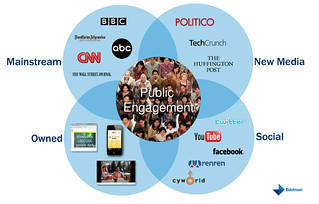



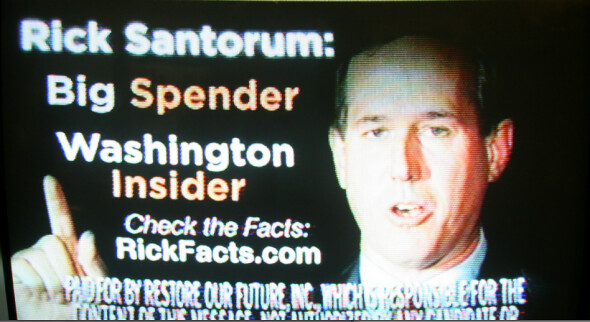

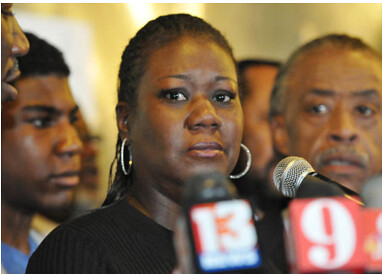





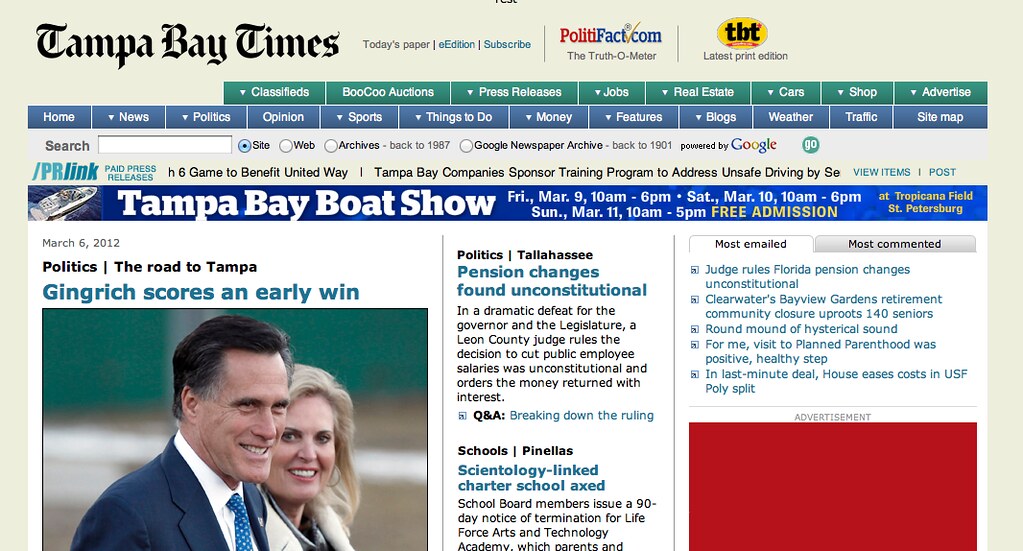
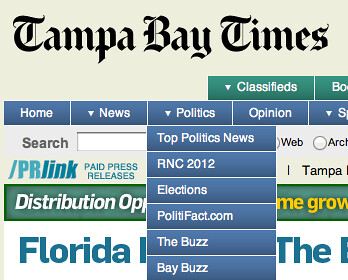
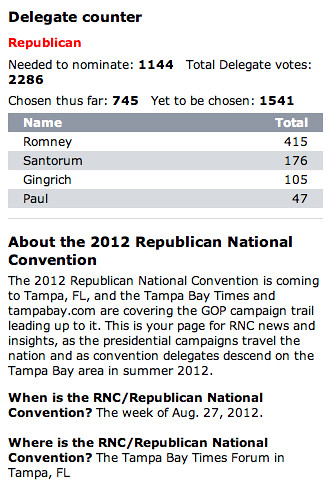

 RSS Feed
RSS Feed